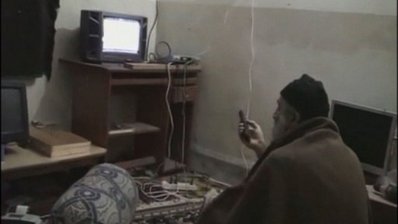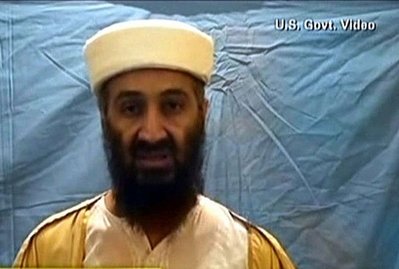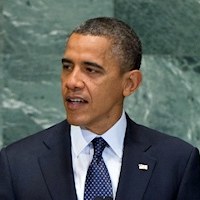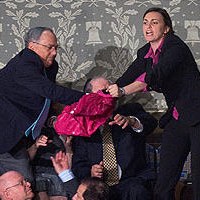![]()
Sat, May 07, 2011 | DebkaFile

The United States has made public several videos seized during the Osama bin Laden raid, part of what US officials described Saturday as the largest terrorism data collection ever. In one of the carefully edited videos, bin Laden is seen sitting on the floor watching his own image on TV. (AFPTV/ US Department of Defense)
U.S. Pushes Pakistani Intelligence to the Wall
A DebkaFile report:
The Obama administration is presenting the successful Osama bin Laden hit as an epic American solo operation, unparalleled in military and intelligence annals, while leaning hard on Islamabad to sack certain officers of the powerful military intelligence army ISI including its head Lt. Gen. Ahmad Shuja Pasha, accusing them of keeping the dead al Qaeda leader hidden for eight years.
The ISI chief is a close confidant of Pakistan’s chief of staff Gen. Ashfaq Parvez Kayani with whom Washington works closely and so the demand for Pasha’s head is seen as casting aspersions on him too.
American sources reported Saturday, May 7 that five days earlier, just hours after bin Laden was killed in Abbottabad, Pakistan, a high-ranking US official landed in Islamabad with a demand to bring the ISI officers involved in sheltering the al Qaeda leader to book.
It now appears that the iconic jihadi leader first arrived in Pakistani in 2003 and stayed in the small village of Chak Shah Mohammad near Haripur 40 kilometers north of the Pakistani capital. According Pakistani sources, this information came from questioning the Bin Laden wife found and detained in the Abbottabad villa where he was killed. She said the family stayed in the village two and-a-half years before moving to Abbottabad in 2005.

This framegrab from an undated video released by the US Department of Defense reportedly show Al-Qaeda leader Osama bin Laden making a video at his compound in Abbottabad, Pakistan. According to the Defense Department, the video was seized from the compound during a May 1 operation by US special forces in which bin Laden was killed. (AFP/AFP/US Department of Defense)
Debkafile’s intelligence sources report that details are slipping out over bin Laden’s secret Pakistani addresses over the years. The ISI used some of those compounds as safe houses for terrorists from other organizations. The Abbottabad villa compound is now revealed as having served as a byway station for terrorists from Pakistan-backed organizations heading for Kashmir, long a violent bone of contention with India.
In summer, however, it had a very different use: High-ranking diplomats and officials of the Pakistani foreign office used it as a holiday villa, attracted by the pleasant climate in this North West Frontier town.
Far from being off the beaten track, the property was therefore in regular use by the authorities in Islamabad.
In the mounting duel between the Obama administration and Pakistan, two conflicting versions of the bin Laden episode are unfolding, with potentially detrimental effect on the Afghan War and global war on terror.
The Americans have embarked on a two-pronged strategy:
1. Friday, May 6, President Barack Obama was cheered by members of the 101st Airborne Division at Fort Campbell, Kentucky, when he said: “Now in recent days, the whole world has learned just how ready they were. These Americans deserve credit for one of the greatest intelligence military operations in our nation’s history.” Pakistan was not mentioned. Obama had just shaken the hands of the Seals members who returned from Abbottabad.
2. Washington is not only cutting Pakistan out of any role in the feat but bent on weakening Pakistani military intelligence and, in particular, the officials tied to Osama bin Laden, on the assumption that they are also in touch with other high-profile al Qaeda leaders and may even be harboring them too. The US also presumes them to be in connection with the very Taliban leaders American soldiers are fighting in Afghanistan.
The Obama administration is vitally interested in weakening the Pakistani factions maintaining those ties and showing Taliban they can no longer be relied on as protection against America’s long arm. The US will ultimately corner Taliban’s leaders, whether by diplomatic engagement or the methods which ended Osama bin Laden’s life.
Pakistan’s take is not just different but increasingly resentful: Its military intelligence insists the bin Laden operation would not have succeeded without close cooperation between the CIA and ISI and the two armies — or some factions thereof — which was maintained at least up until President Obama’s decision to authorize the Abbottabad raid. This view is supported by some Western counterterrorism agencies engaged in the war on al Qaeda.
Pakistani officials suspect the US administration heads is deliberately denying them a measure of credit for the successful mission because, with bin Laden gone, Obama feels confident enough to go straight to the Taliban to negotiate an end to the Afghanistan war and dispense with Pakistan’s good services as intermediaries. With the al Qaeda leader out of the way, he wants to see the back of a Pakistan role in Afghanistan.
Debkafile’s counter-terror sources warn that the rising acrimony between Washington and Islamabad may well deter Pakistani intelligence from fingering more wanted al Qaeda figures and their hideouts — or even encourage the ISI to stand aside when Taliban goes for American targets in revenge for bin Laden’s termination.



 RSS
RSS










U.S. Pushes Pakistani Intelligence to the Wall | #Pakistan #US #OsamabinLaden http://j.mp/mvhcHK
RT @CrethiPlethi: U.S. Pushes Pakistani Intelligence to the Wall | #Pakistan #US #OsamabinLaden http://j.mp/mvhcHK
RT @CrethiPlethi: U.S. Pushes Pakistani Intelligence to the Wall | #Pakistan #US #OsamabinLaden http://j.mp/mvhcHK